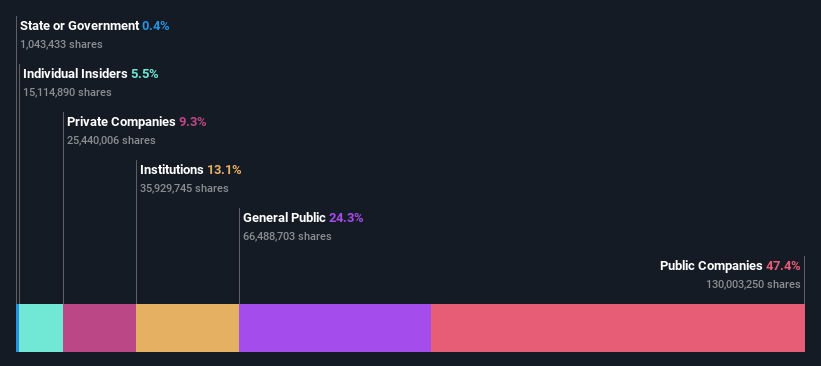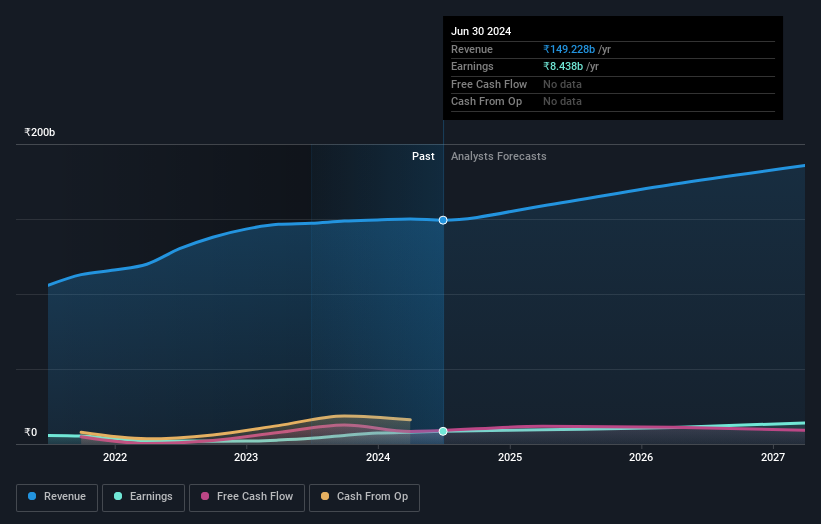- India
- /
- Auto Components
- /
- NSEI:JKTYRE
JK Tyre & Industries Limited's (NSE:JKTYRE) stock price dropped 6.5% last week; public companies would not be happy
Key Insights
- The considerable ownership by public companies in JK Tyre & Industries indicates that they collectively have a greater say in management and business strategy
- 51% of the business is held by the top 2 shareholders
- Institutions own 13% of JK Tyre & Industries
A look at the shareholders of JK Tyre & Industries Limited (NSE:JKTYRE) can tell us which group is most powerful. And the group that holds the biggest piece of the pie are public companies with 47% ownership. Put another way, the group faces the maximum upside potential (or downside risk).
As a result, public companies as a group endured the highest losses last week after market cap fell by ₹7.8b.
Let's delve deeper into each type of owner of JK Tyre & Industries, beginning with the chart below.
See our latest analysis for JK Tyre & Industries

What Does The Institutional Ownership Tell Us About JK Tyre & Industries?
Institutions typically measure themselves against a benchmark when reporting to their own investors, so they often become more enthusiastic about a stock once it's included in a major index. We would expect most companies to have some institutions on the register, especially if they are growing.
We can see that JK Tyre & Industries does have institutional investors; and they hold a good portion of the company's stock. This implies the analysts working for those institutions have looked at the stock and they like it. But just like anyone else, they could be wrong. When multiple institutions own a stock, there's always a risk that they are in a 'crowded trade'. When such a trade goes wrong, multiple parties may compete to sell stock fast. This risk is higher in a company without a history of growth. You can see JK Tyre & Industries' historic earnings and revenue below, but keep in mind there's always more to the story.

We note that hedge funds don't have a meaningful investment in JK Tyre & Industries. The company's largest shareholder is Bengal & Assam Company Limited, with ownership of 47%. For context, the second largest shareholder holds about 3.2% of the shares outstanding, followed by an ownership of 1.9% by the third-largest shareholder. In addition, we found that Raghupati Singhania, the CEO has 0.7% of the shares allocated to their name.
To make our study more interesting, we found that the top 2 shareholders have a majority ownership in the company, meaning that they are powerful enough to influence the decisions of the company.
While studying institutional ownership for a company can add value to your research, it is also a good practice to research analyst recommendations to get a deeper understand of a stock's expected performance. There are plenty of analysts covering the stock, so it might be worth seeing what they are forecasting, too.
Insider Ownership Of JK Tyre & Industries
While the precise definition of an insider can be subjective, almost everyone considers board members to be insiders. The company management answer to the board and the latter should represent the interests of shareholders. Notably, sometimes top-level managers are on the board themselves.
Insider ownership is positive when it signals leadership are thinking like the true owners of the company. However, high insider ownership can also give immense power to a small group within the company. This can be negative in some circumstances.
We can see that insiders own shares in JK Tyre & Industries Limited. The insiders have a meaningful stake worth ₹6.1b. Most would see this as a real positive. Most would say this shows alignment of interests between shareholders and the board. Still, it might be worth checking if those insiders have been selling.
General Public Ownership
With a 24% ownership, the general public, mostly comprising of individual investors, have some degree of sway over JK Tyre & Industries. While this group can't necessarily call the shots, it can certainly have a real influence on how the company is run.
Private Company Ownership
Our data indicates that Private Companies hold 9.3%, of the company's shares. It's hard to draw any conclusions from this fact alone, so its worth looking into who owns those private companies. Sometimes insiders or other related parties have an interest in shares in a public company through a separate private company.
Public Company Ownership
Public companies currently own 47% of JK Tyre & Industries stock. This may be a strategic interest and the two companies may have related business interests. It could be that they have de-merged. This holding is probably worth investigating further.
Next Steps:
It's always worth thinking about the different groups who own shares in a company. But to understand JK Tyre & Industries better, we need to consider many other factors. Consider for instance, the ever-present spectre of investment risk. We've identified 3 warning signs with JK Tyre & Industries , and understanding them should be part of your investment process.
If you would prefer discover what analysts are predicting in terms of future growth, do not miss this free report on analyst forecasts.
NB: Figures in this article are calculated using data from the last twelve months, which refer to the 12-month period ending on the last date of the month the financial statement is dated. This may not be consistent with full year annual report figures.
New: Manage All Your Stock Portfolios in One Place
We've created the ultimate portfolio companion for stock investors, and it's free.
• Connect an unlimited number of Portfolios and see your total in one currency
• Be alerted to new Warning Signs or Risks via email or mobile
• Track the Fair Value of your stocks
Have feedback on this article? Concerned about the content? Get in touch with us directly. Alternatively, email editorial-team (at) simplywallst.com.
This article by Simply Wall St is general in nature. We provide commentary based on historical data and analyst forecasts only using an unbiased methodology and our articles are not intended to be financial advice. It does not constitute a recommendation to buy or sell any stock, and does not take account of your objectives, or your financial situation. We aim to bring you long-term focused analysis driven by fundamental data. Note that our analysis may not factor in the latest price-sensitive company announcements or qualitative material. Simply Wall St has no position in any stocks mentioned.
About NSEI:JKTYRE
JK Tyre & Industries
Develops, manufactures, markets and distributes automotive tyres, tubes, flaps, and retreads in India, Mexico, and Internationally.
Adequate balance sheet average dividend payer.
Similar Companies
Market Insights
Community Narratives




